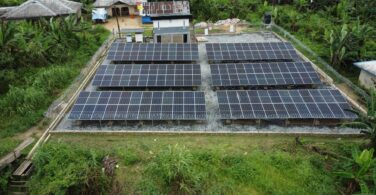A global roadmap for an inclusive circular economy
Chatham House with support from UNIDO, WBCSD, AfDB, ACEN, GIZ, UNEP, Circular Innovation Lab, EU CE Stakeholder Platform, PACE, World Economic Forum, IGES, Circular Electronics Partnership, Circle Economy Foundation and The Wyss Academy for Nature have officially launched the 'Global Roadmapping process for an Inclusive Circular Economy'.
If you wish to sign up to participate in the global roadmapping process please sign up here to ensure you get regular updates: Join the Global Circular Economy Roadmap process
To contribute to the first output of the roadmapping process - a paper titled 'Circular Futures 2050' to be presented at the UN Summit of the Future 2024, please see here to the draft paper and here to submit your inputs and reflections on the paper by 30th June 2024.

Photo by Fransesco Lo Guidice on Unsplash
The global circular economy transition is highly fragmented. As of 2024, a total of 75 national circular economy roadmaps and strategies have been launched (71 since 2016). These publications include a collective commitment from governments to introduce just under 3000 individual circular economy policies spanning 17 sectors and 153 policy categories over the coming decade. Additionally, Chatham House has identified an existing 540 circular economy policies launched across 110 countries (80% of which have been launched since 2010). This rapid policy proliferation demonstrates growing momentum within the global community, signalling a shared aspiration to transition towards a circular economy[1].
Despite this rapid proliferation, findings from this Global Stocktake on National Circular Economy Roadmaps show three major shortcomings: (i) First, the majority fail to consider the unintended consequences of national circular economy policies on key trading partners (particularly those in the global south) as well as the dependence on global coordination and collaboration to achieve domestic circular policy goals; (ii) Second, the majority of roadmaps fail to consider the elements of just transition and social equity (including worker and consumer rights) within their agendas; (iii) Third, most existing roadmaps and policies do not provide adequate public resources to fund circular initiatives or provide mechanisms on how to leverage private sector finance for circular business models.
There is a heightened risk of increasing fragmentation through growing trends in deglobalization and geopolitical conflict. The combination of these factors will not only restrict domestic CE efforts, but also the CE’s vital contribution to wider environmental and social goals (Climate, Biodiversity, Pollution, human development).
Targeted coordination and collaboration by the global community, with the aim of achieving a globally inclusive circular economy, can help overcome these challenges and generate significant opportunities and synergies for all involved. Certain areas warrant greater collaboration and consensus forming amongst the global community. These include the likes of circular finance, supply chain transparency and traceability, standards and definitions, and trade policy. Greater knowledge exchange on circular roadmaps and policies would also prove beneficial. Despite the obvious gains from greater coordination and collaboration, there is yet no single multilateral process or body which can help foster a more harmonized and coordinated global transition.

Global inclusive circular economy roadmap process
The rationale and objectives behind the global initiative is the following:
- Developing a shared vision for an inclusive circular economy. Currently, there is no collective common vision for an inclusive global circular economy transition. Yet a shared vision on a circular economy which aims to deliver prosperity and equity for all can become an important anchor point around which global circular rules and process can emerge. Such a vision can also feed into other related multilateral processes and initiatives.
- Identifying and acting on essential areas for mutual collaboration and coordination.
Many governments have or are preparing national circular economy roadmaps. Yet, on the international and multilateral level there is no process or mechanism of sufficient scale to facilitate integrated coordination and policy alignment. A global roadmapping process could support policy exchanges and sharing of lessons learned on national level and unlock the pathway to a global inclusive circular economy. It can also help identify areas for international collaboration which deliver mutual gains, for example on the topics or standards and definitions, finance and supply chain transparency and traceability. - Raising global ambition.
To increase the level of ambition for the circular economy and adequately address the triple planetary crisis, a global roadmap process can enable ambitious actors to come forward and lead the way, identify areas for collective actions, and propose solutions that need to be advanced at the international level.
Sign up here to join the global process
In the run-up to Stockholm+50, Chatham House’s Environment and Society Programme convened a series of international online workshops and stakeholder dialogues and launched a white paper at the Stockholm+50 conference in June 2022, presenting the idea of a global roadmap for an inclusive circular economy. Based on the feedback received by multiple stakeholders from around the world including governments, business leaders, circular economy practitioners, the research community and civil society, Chatham House has decided to move ahead, with support from UNIDO, WBCSD, AfDB, ACEN, GIZ, UNEP, Circular Innovation Lab, EU CE Stakeholder Platform, PACE, World Economic Forum, IGES, Circular Electronics Partnership, Circle Economy and The Wyss Academy for Nature and officially launched the initiative at the World Circular Economy Forum that took place in Kigali in December 2022.

